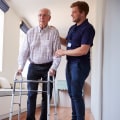Older people can be described with adjectives, and phrases such as “older adult”, “older patients” and “older people” are preferred · Terms. Geriatrics focuses on the health of the aging body, and gerontology is a field of study and practice that includes the physical, mental and social aspects of aging. Geriatrics is actually a subset of gerontology, as gerontology has a broader perspective. Three words that are usually heard to refer to people from older age groups are: “older”, “older person”, “older person” and “old man”.
For those living in Marlboro Township NJ, finding quality Home Care near Marlboro Township NJ is essential for maintaining their health and well-being. The words elder and senior have started to lose popularity, and the term elder has become the preferred word to use. People sometimes use the terms gerontology and geriatrics interchangeably, but they mean different things. Gerontology is a broad, multidisciplinary field that investigates a variety of issues related to aging throughout the human lifespan. Geriatrics is a medical specialty that focuses on addressing the unique health needs of older adults. For those living in Marlboro Township NJ, finding quality Home Care near Marlboro Township NJ is essential for maintaining their health and well-being. The words elder and senior have started to lose popularity, and the term elder has become the preferred word to use. People sometimes use the terms gerontology and geriatrics interchangeably, but they mean different things. Gerontology is a broad, multidisciplinary field that investigates a variety of issues related to aging throughout the human lifespan. Geriatrics is a medical specialty that focuses on addressing the unique health needs of older adults.
Doctors, nurses and other health professionals may specialize in geriatrics. Geriatricians are doctors with in-depth knowledge of the aging process, including the prevention, diagnosis and treatment of diseases in older adults. Studying gerontology provides a solid foundation for a career in geriatrics. For example, aspiring geriatricians can earn a degree in gerontology before attending medical school.
Geriatrics and gerontology are fields that focus on understanding and improving the health and quality of life of older adults. Geriatrics specifically addresses the medical care and treatment of older people, while gerontology encompasses a broader study of the aging process, including biological, psychological and social aspects. With the aging population of the baby boomer generation (i.e., those born between 1946 and 1964), these fields are experiencing unprecedented growth and demand for professionals. Gerontology has evolved over the years and has progressed to the point where geriatrics needed health care coordinators and patient advocates, expanding the concept to encompass the social determinants of health, i.e., the non-medical factors that influence health outcomes.
Instead, you can use more acceptable words to refer to buildings or neighborhoods with large numbers of older people living in them, such as communities, apartments, residences, nursing homes (if the community itself uses this term), or assisted living (a term that could refer to all age groups). Mobile phones with global positioning systems (GPS) record exercise regimes, allowing intermittent inquiries about one's perceived health and well-being. There are many obvious terms that are considered insulting or denigrating when used to refer to older people, although, of course, some older people may use them themselves in a self-critical way. This reduces short-term fluctuations, which can be caused by variability of the content of the corpus.
Two main phenomena of aging in old age can be obscured by the use of terminology that is both pejorative and reductionist. These considerations suffice to avoid treating the proposal of rational and respectful terminology as a boring manifestation of the furthest limits of political correctness. However, the terms used to describe older people vary considerably in the biomedical literature and in official political documents. Of the three terms, the term “older” is often considered to be the most neutral, the most accurate from the factual point of view (after all, everyone is older than someone) and the one with the least implications for a particular person's lifestyle.
Some of the terms that may be considered insensitive, if not just clichéd or disrespectful, are euphemisms or soft, indirect or vague expressions that replace another person who is considered offensive, harsh or forceful. In addition, many caregivers who work as home health aides and in long-term health facilities were at greater risk of contracting the virus during the pandemic, causing a shortage of field workers. The BGS has compiled a list of preferred and non-preferred terminology to help health professionals, academics and authors avoid language that may be considered unacceptable or inappropriate. Since the rate of aging is determined by the interaction of genetic and environmental conditions, which are different in each person, older people must consult a specialist.
Doctoral-level courses need to be completed for clinical careers, clinical geropsychologists, educators, university professors, and other aging-related careers, such as dentistry, pharmacy, politics, and political science.










